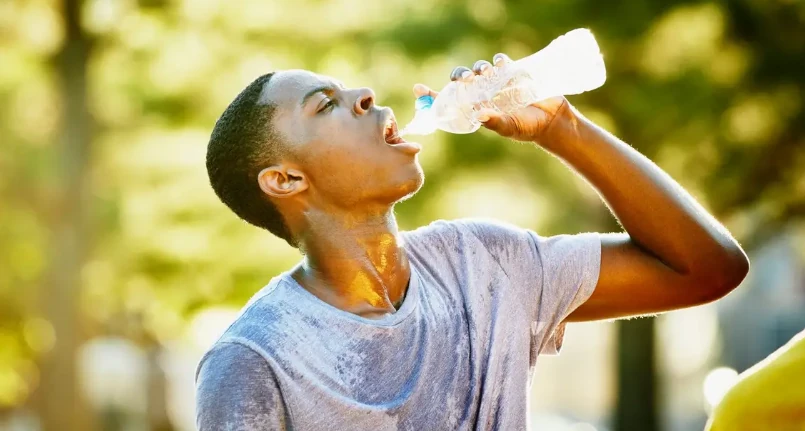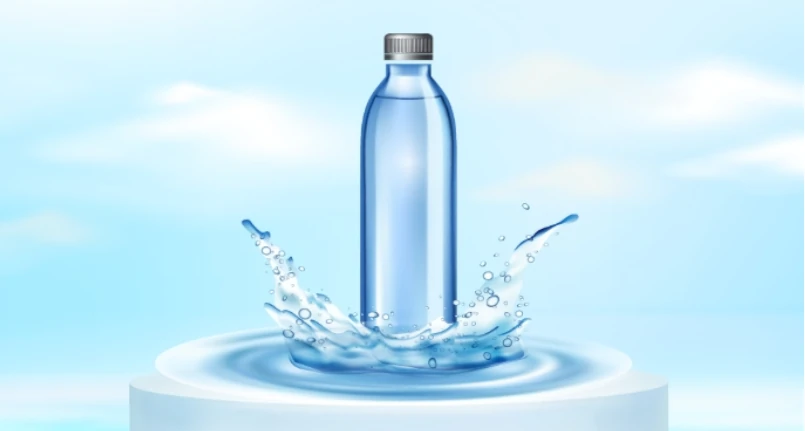Introduction
Water in the Human Body
Water, therefore, is the most important constituent of our body and it is known that without its contribution from the outside we can only survive for a few days.
Things
Dehydration: What is it?
Dehydration is the lack of water in the body, a lack which may be due to an insufficient intake in the diet and/or excessive losses ( profuse sweating and diarrhea , repeated vomiting , burns , bedsores , polypnoea, taking diuretics , laxatives or particularly low-salt water , a high-protein diet , diabetes mellitus , diabetes insipidus , heavy salt consumption ).
Dehydration becomes morbid when loss exceeds 5-6% of body weight.
In basal physiological conditions (at rest) and at room temperature (18-20°), water losses are less than 1 ml/min .
With physical activity and the increase in external temperature, these losses, mainly due to sweating, can reach 15-25 ml/min .
| Route of elimination of body water | Indicative water loss (ml/day) |
| Urine | 1000-1500 |
| I did | 150 |
| Lungs | 500-700 |
| Skin | 200 |
Although the body is capable of limiting – even considerably – water losses, we must never forget the importance of water in human nutrition . It is not uncommon for people to combine a reduced intake of liquids with a diet low in vegetables (consisting of about 90% water) and rich in dehydrating drinks (coffee, spirits, cola, etc.), with inevitable suffering from whole organism.
Body water is present in three different compartments :
- Intracellular : it represents 40-50% of the body weight and is very important for the normal development of the metabolic processes of the cells ;
- Intravascular : represents 7% of body weight and is the main component of blood plasma ;
- Extracellular : it constitutes 17-20% of body weight, is found in the spaces between one cell and another and allows the exchange of substances between the blood in the capillaries and the cells.
Types
Types of Dehydration
Three types of dehydration can be distinguished: hypertonic, isotonic and hypotonic.
Hypertonic dehydration
Hypertonic dehydration is characterized by elevated plasma sodium levels ( > 145 mmol/L) and hyperosmolarity; it is the typical consequence of profuse sweating and the consequent drop in plasmatic volume (loss of excess water on sodium, because sweat is hypotonic , as we will see better later).
Isotonic dehydration
Usually, isotonic dehydration follows vomiting or diarrhea (loss of water and electrolytes , especially sodium, in balanced proportions).
Hypotonic dehydration
Hypotonic dehydration is characterized by a decrease in plasma sodium levels ( hyponatremia ) and a reduction in osmolarity ;
Hypotonic dehydration is the typical consequence of the abuse of diuretics or of rehydration with low-sodium waters (be careful, in summer, associating low-sodium diets with the consumption of low fixed residue waters can be dangerous: salt is not an absolute enemy; a moderate intake of it is correct, but not its complete abstinence).
It is no coincidence, therefore, that many people report that they are still thirsty despite drinking a lot of low-salt water.
Symptoms
Dehydration: Symptoms
A sense of thirst is the most characteristic symptom of dehydration. However, it should be noted that, in many circumstances, this manifestation occurs when dehydration is already in a very advanced stage.
Dehydration: Typical symptoms in the Adult
In adult humans, dehydration typically manifests as:
- Extreme thirst;
- Less frequent urination ;
- dark colored urine;
- Fatigue;
- Dizziness ;
- Confusion .
Dehydration: Typical symptoms in children
In infants and children, dehydration presents with:
- Dry mouth and tongue;
- Absence of tears during crying;
- Dry diaper for more than three hours (indicative of infrequent urination);
- Sunken eyes ;
- Listlessness and irritability.
Learn more about Dehydration
- Drinks against dehydration
- Dehydration: Causes and Symptoms
- Remedies for Dehydration




